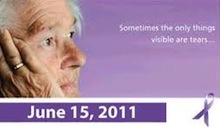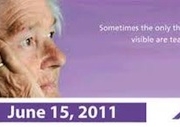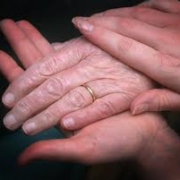World Elder Abuse Awareness Day (15 June) – A reminder to treasure, honour and protect the older members of our community
 You are unlikely to read about it in the British press, but today, 15 June, is World Elder Abuse Awareness Day.
You are unlikely to read about it in the British press, but today, 15 June, is World Elder Abuse Awareness Day.
A recent report by the Care and Social Services Inspectorate for Wales shows a 9% rise in the number of adult protection referrals in 2009-10. Around 5,000 cases of abuse are being investigated in Wales every year, the majority of those cases involving older people.
On a regular basis we see media coverage about older people being mistreated. Elder abuse takes place in many different settings – for example, the older person’s home, care homes, nursing homes and hospitals. It happens when an older person’s human rights and dignity are violated. It can come through financial scams, physical attacks, sexual abuse, psychological abuse or neglect. The perpetrators are often in a position of trust and have control of the life of the older person.
Elder abuse can also include actions that many people might not consider. For example, physical abuse can include inappropriate use of medication or force feeding, emotional abuse can include treating an older adult like a baby or otherwise injuring his or her dignity, and sexual abuse includes any sexual contact with a person who is incapable of consenting.
Furthermore, older adults are particularly vulnerable to less common forms of abuse, such as neglect and abandonment, violations of rights to privacy, community support and information, and financial abuse, which is the most prevalent form of abuse among older adults.
Financial abuse is ‘the illegal or improper use of an incapacitated or vulnerable adult or his resources for another’s profit or advantage.’
This type of exploitation can take many forms such as forgery, misappropriation of cash or assets, abuse of joint accounts, or abuse of power of attorney. Signs of financial exploitation may include disparity between income and assets, unexplained or sudden inability to pay bills, inaccurate or no knowledge of finances, fear or anxiety when discussing finances, or unprecedented transfer of assets to others.
Financial exploitation of a vulnerable adult can occur:
1. Without the elder’s knowledge
2. By trickery, intimidation, or coercion, or
3. When the elder is too confused to give informed consent
A slight majority of financial exploitation victims are elderly females over age 70 who live alone. They may also suffer from one or more physical or mental impairments. Perpetrators are most often relatives of the victim, typically the adult children.
Nationwide financial exploitation is the third most frequent form of abuse after neglect and emotional abuse. Estimates are that 30-40% of elder abuse involves some form of financial exploitation.
It is often argued that legalising euthanasia or assisted suicide would be a recipe for elder abuse. Given the vulnerability of many older people, who already feel themselves to be a financial, emotional or care burden on others, this is a powerful reason for not changing the law.
There are too many people already who have an interest, financial or otherwise, in an older person’s death. Let’s not give them any encouragement. And let’s work to honour, protect and uphold the older members of our community.
The Bible insists that we respect and honour old people (Leviticus 19:32; Proverbs 20:29) carry their burdens; listen to their advice (Proverbs 23:22-23; Job 32:6-9) and serve them as we would serve the Lord himself.
I’ll leave the last words to Mark Cheesman, in a Triple Helix article on the subject:
The Scriptures do not hold older people up as infallible, and are honest about the besetting sins and faults of old age. But they also see them as given to the younger people for their profit, just as the younger ones are given to the older folks.
It is a stark fact that many non-Christian communities esteem their elderly people far more than does the Western church. We should main-stream the older people in our churches: honour and make space for their input, and seek their prayers and wisdom. We should make many fewer mistakes if we did! And old people would feel much better about themselves, and be spurred on to greater things rather than just feeling a waste of space.
Further reading
The International Network for the Prevention of Elder Abuse












Leave a Reply
Want to join the discussion?Feel free to contribute!